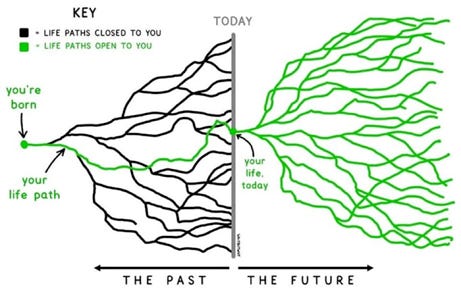Update on the Reads Delivery Service
The response to the idea of compiling the best pieces I’ve read was overwhelmingly positive. Nonetheless, it surprised me that many of you would rather have the digital (ePub/PDF) version. I wasn’t expecting that. What I thought I could do is the following.
I will be gifting the digital compilations to paid subscribers. It is my way to thank you for your support and increase the value you receive. Jeff Bezos’ letters have given me a whole new perspective. I think this is a step in the right direction.
With quality maximization in mind, I won’t be doing this with a stipulated frequency. I have already drafted in my mind the first 3 or 4. Each of those might be sent every 4-5 weeks. After those, my sense is that I’ll have a new one every 2-3 months. I need to read, write, and think a lot to make a selection that’s worth going through.
The first one should be done for next Sunday. Only an article of my own is missing for the compilation to be complete. I genuinely hope my selections help increase your cognitive performance, which should lead to more profitable investing.
Article
Dostoevsky is the deepest thinker I’ve so far come across. In Notes from Underground, he posts a thesis that attracted my attention. Fyodor starts theorizing about what could happen if Man had everything sorted out. His conclusion was counterintuitive as well as brilliant. The analogy Dostoevsky employed was between a man and a piano key. From the latter, he highlights that you can accurately predict all of its future states upon different inputs.
Fyodor imagines a world where people develop a mathematical model to predict what will happen in the future, a periodic table for future events. In such a dreadful scenario, he thinks Man would de-estimate the table’s legitimacy, even though reality backs it up. The periodic table, however, could be so truthful that even this de-estimation would be predicted and could therefore be avoided, if reason is consulted. In response to this eventuality, Fyodor posits that Man would willingly lose his reason, just to prove to himself that he is indeed a man, and not a piano key.
“Shower upon him every earthly blessing, drown him in a sea of happiness, so that nothing but bubbles of bliss can be seen on the surface; give him economic prosperity, such that he should have nothing else to do but sleep, eat cakes and busy himself with the continuation of his species, and even then out of sheer ingratitude, sheer spite, man would play you some nasty trick. He would even risk his cakes and would deliberately desire the most fatal rubbish, the most uneconomical absurdity, simply to introduce into all this positive good sense his fatal fantastic element.”
We crave uncertainty. We despise linearity. Even though in The Brothers Karamazov Dostoevsky claims that humans do not inherently want free will, I find this to be a good in-between. The unknowable nature of the coming time is what makes it be full of possibilities. You are always one decision away from changing your life.

I suspect that the number of paths one gets to potentially transit depends on our breadth of knowledge. Charlie thought it is our moral duty to fight our innate ignorance. The man-with-a-hammer tendency needs to be avoided at all costs. Otherwise, one might be forcefully locked into a single, mostly linear, path. Breadth is what may provide us with the capacity to spot tangents and other branches.
In the same line, one needs to equip themselves with as many tools as possibles so that they can combat uncertainty in an effective manner. Only in uncertainty is where extraordinary results lie. Accessing them is, however, demanding. Only well-suited climbers get to climb the highest and most vertiginous mounts.
“The easiest way to get what you want in life is to deserve it. How could it be other way?” Munger
It might be the case that, at any given point in time, a somewhat accurate estimation could be made as to how well an investor will perform. The pricing mechanism makes us compete in a very subtle way, by sending signals. The nature of these signals is what needs to become the unit of analysis. Their quality. If there was an instrument that could measure the quality of our inputs when making a decision, I suspect it could help make an educated guess on how an investor will do.
Although the investing field is full of unknowns and unknowables, it should be as with any other discipline. Learning is at the core of performance improvement. It provides one with tools to detect places where there is favorable randomness. Importantly, it’s in the lenses through which we analyze situations that I think one needs to work on. More sophisticated, but external, resources are of no use to a mind that cannot make sense out of them. Hence, my initial hypothesis is the following:
The person who counts with the highest quality of inputs for sending their signals represents at least 80-90% of outperformers, irrespective of the resources they count on.
Personal Commentary
I need to meditate more about this. First time I encountered this avenue for thought. I nonetheless hope these two or three concepts trigger some thinking of your own. I will try to write my article on Zeckhauser’s essay in the coming weeks, so that the first reads compilation is finished.
Open to Work
If you have any project you think I can help with, contact me at giulianomana@0to1stockmarket.com


It is always interesting for me to think about all the different options we've had over our lifetime and the multiple paths we could've taken. I think this is the fun part in life and without that, I would have difficulty seeking for more. Thanks for sharing! Take care!